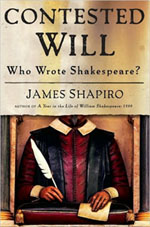 Not so long ago I wrote some essays in response to Ron Rosenbaum’s The Shakespeare Wars, leading off with one entitled “Thus Diest Common Sense“. Now I find myself writing a reaction to another recent book about Shakespeare, and once again common sense has found its way into the title.
Not so long ago I wrote some essays in response to Ron Rosenbaum’s The Shakespeare Wars, leading off with one entitled “Thus Diest Common Sense“. Now I find myself writing a reaction to another recent book about Shakespeare, and once again common sense has found its way into the title.
In this case I’ve been reading Contested Will: Who Wrote Shakespeare? This is a rather excellent piece of work by James Shapiro which explores the totality of the “authorship question” (the conspiracy theory which claims that Shakespeare didn’t write Shakespeare) from a refreshing angle: Instead of merely exploring the idea itself, Shapiro explores the history of that idea — the ways in which literary criticism, Shakespeare studies, and the “anti-Stratfordians” have evolved over the past four centuries. The result is a compelling and intriguing narrative in which Shapiro aptly makes the case that the “authorship question” is the natural reaction to the excesses of Shakespearean scholarship: If you raise Shakespeare to the level of a deity, it’s little wonder that people will have difficulty seeing the mortal man of William Shakespeare as being a suitable candidate for godhood. And if you insist on trying to patch the holes in Shakespeare’s biography by forcefully extracting autobiography from his plays and poems, then you open the doors for people to say, “Shakespeare can’t have written these plays because somebody else has a biography which has more in common with Romeo or Prospero or Hamlet.” (Or whoever the subjective critic chooses to pick as the “most autobiographical” of Shakespeare’s infinite variety of characters.)
Along the way, Shapiro deftly deflates one “anti-Stratfordian” claim after another with a mixture of rigorous, thorough, and essentially irrefutable scholarship. The result is extremely entertaining, and I recommend the book highly.
Unfortunately, the book is not without flaw. Shapiro occasionally falls into the same traps of fallacy and assumption which plague the pseudo-scholarship of the Oxfordians, Baconians, and Marlovians. For example, on page 177 he writes:
Enough incidents in Oxford’s life uncannily corresponded to events in the plays to support Looney’s claims that the plays were barely veiled autobiography. Like Hamlet, Oxford’s father died young and his mother remarried. Like Lear, he had three daughters — and his first wife was the same age as Juliet when they married. […]
Until now, critics had failed to identify these “cunning disguises” because they had the wrong man. Oxford’s authorship, Looney was convinced, made everything clear. Hamlet offered the best example, and Looney matches its cast of characters with those in Oxford’s courtly circle: Polonius is Lord Burleigh, Laertes is his son Thomas Cecil, Hamlet is Oxford himself, and Ophelia is Oxford’s wife, Anne. But such claims about representing on the public stage some of the most powerful figures in the realm betray a shallow grasp of Elizabethan dramatic censorship. Looney didn’t understand that Edmund Tilney, the Master of the Revels, whose job it was to read and approve all dramatic scripts before they were publicly performed, would have lost his job — and most likely his nose and ears, if not his head — had he approved a play that so transparently ridiculed privy councillors past and present. Looney’s scheme also defies common sense, for Lord Burleigh was dead by the time Hamlet was written, and nothing could have been in poorer taste, or more dangerous, than mocking Elizabeth’s most beloved councillor soon after his death, onstage or in print.
Shapiro’s general point is true: If the play was actually written as allegory in the way that Looney described, then it would be politically dangerous to have written it.
… which would rather neatly explain why Oxford would choose to write it under a pseudonym, right? Rather than “defying common sense”, the scenario makes perfect sense.
Shapiro is also pulling another fast one when he claims that “Lord Burleigh was dead by the time Hamlet was written” because the Oxfordians re-date the composition and performances of all the plays to support earlier dates. (They have to. Oxford died in 1604 and Shakespeare kept writing plays until at least 1613.) Now, it’s absolutely true that the Oxfordian efforts to re-date the plays contradict the existing historical record and, frequently, the texts of the plays themselves. But it’s not fair to simply ignore the totality of the Oxfordian theory while you cherry pick bits of it out of context.
Does that mean that I think Shakespeare didn’t write Shakespeare?
Let’s not be ridiculous. Even if Shapiro, upon rare occasion, fails to provide the best possible rebuttal of the Oxfordian’s claims, it doesn’t change the fact that the theories of the Oxfordians (and Baconians and Marlovians) are complete nonsense.
For example, one of the favorite Oxfordian claims is that there’s no contemporary evidence identifying William Shakespeare as the guy who wrote the plays by William Shakespeare. This is absolutely true… as long as you ignore the dozens of published plays bearing his name on the title page; the contemporary references to Shakespeare writing the plays by critics, fellow authors, and members of the public; Master of the Revels accounts referring to Shakespeare’s authorship; and the effusive memorials and eulogies dedicated to Shakespeare’s memory and his work shortly after his death.
As long as you ignore all of that evidence, it’s true that there’s absolutely no such evidence.
The truth is that we have more historical evidence of William Shakespeare writing the plays bearing his name than we do for virtually any other Elizabethan playwright. (The exception would be Ben Jonson, who had the advantages of being a tireless self-promoter, living an extra twenty years, and becoming England’s first Poet Laureate.)
The truth is, this whole “anti-Stratfordian” nonsense should be dumped into the same bucket of nonsense in which we find flat-earthers, creationists, 9/11 conspiracy nuts, and people who think we faked the moon landings.
DEALING WITH OXFORDIANS
If you happen to find yourself in a discussion or debate with an “anti-Stratfordian”, here’s what you do:
(1) Ask them exactly what sort of objective evidence would convince them that William Shakespeare wrote the plays of William Shakespeare.
Then ask them to provide such evidence for their favored candidate.
Occasionally you might find one of them trying to pull a fast one on you. For example, they might say, “Proof that Shakespeare owned a book.” You might point to the contemporary references to Shakespeare’s literacy. Or you might point out that the entire argument that Shakespeare didn’t own any books is predicated on the fact that his will doesn’t itemize them… but his will doesn’t itemize a lot of stuff. It doesn’t mention tables or chairs, but that doesn’t mean his family ate off the floor. The books would have been either given to his sister Joan (who got the house she was living in and everything in it) or to his daughter (who received another batch sum of property).
But Oxfordians are likely to be impervious to such arguments, so you may need to fall back on Plan B: “Oh? Really? Anyone who can be demonstrated to own a book in Elizabethan or Jacobean England must have been the person who wrote Shakespeare’s plays? That’s going to be a mighty long list!”
(2) This is why most Oxfordians prefer not to deal with objective evidence. Instead, they found their theory on a close reading of the plays: By insisting that the author of the plays must have been basing them on autobiographical details, they can “demonstrate” that Oxford (who had three daughters) is more likely to have written King Lear (who also had three daughters) than Shakespeare (who only had two).
Such a claim is, of course, completely nonsensical.
But let’s run with it: Oxford didn’t have two sons. Ergo, he couldn’t have written the character of Kent in King Lear, so those sections of the play must have been written by somebody else. We have no evidence that Oxford was ever a woman who dressed up like a man and ran away to the forest with her cousin, so obviously he can’t be responsible for Rosalind in As You Like It. I think it safe to say that Oxford never even met a Fairy Queen or a Fairy King, so A Midsummer Night’s Dream is right out.
This isn’t particularly informative, but it sure is a lot of fun!













ARCHIVED HALOSCAN COMMENTS
Dave Cesarano
Targetting HAMLET for autobiographical material is a bit risky, especially since the play is so difficult to grasp and understand. I have to ask, could Oxford really have identified himself with the eponymous prince? Anyone else in his position (say, Othello) would have just killed Claudius and been done with it shortly after meeting the Ghost. But Hamlet doesn’t, not until the end, when he’s seems to have resigned himself to playing his part. It’s almost as if he knows he’s in a play and spends half of the story trying to reject the knowledge and avoid his scripted destiny. To say that it is autobiographical troubles me, especially since we aren’t presented with any details of Oxford’s own personality with which to compare his behaviors with Hamlet. While all the other identifications could have merit, I find any attempts to identify Hamlet’s personality and behaviors with a real-world counterpart to be risky at best, and perhaps that’s the weakest link in the Oxfordians’ reasoning.
Wednesday, July 07, 2010, 5:56:39 PM
DmL
I think Shakespeare might have been a creationist. : )
Wednesday, July 07, 2010, 11:06:42 AM
Jeff Rients
Sounds like a good read. Looking for biography in the plays strikes me as ridiculous, given the totality of humanity. The lack of specificity in the will still bugs me, though. I’d love to see someone compare the level of detail in Shakespeare’s will to both contemporary playwrights and contemporary businessmen generally fitting the profile of the purported Ordinary Guy from Stratford.
Wednesday, July 07, 2010, 6:27:01 AM
Justin Alexander
Shapiro actually touches on this a bit. Apparently it was actually common practice at the time for a separate inventory of property (and its disbursement) to be prepared as an ancillary document supporting the will. But very few of these documents survive, because while the will itself had to be legally filed with the government, the inventory of property did not. So whenever you hear an anti-Stratfordian rambling on about how books or plays or whatever weren’t mentioned in Shakespeare’s will, just remember that the document which would have contained those references simply doesn’t exist.
In general, I’ve always looked at trying to parse meaning out of legal bequeaths without any concept of their context or content to be a fairly tenuous field of study. It’s like the “second best bed” he left to his wife. Is that a slight from which we can conclude he didn’t like his wife? Or was that a piece of furniture which held a sentimental attachment for been specifically requested by Anne? We’ll almost certainly never know.
Wednesday, July 07, 2010, 11:32:15 AM